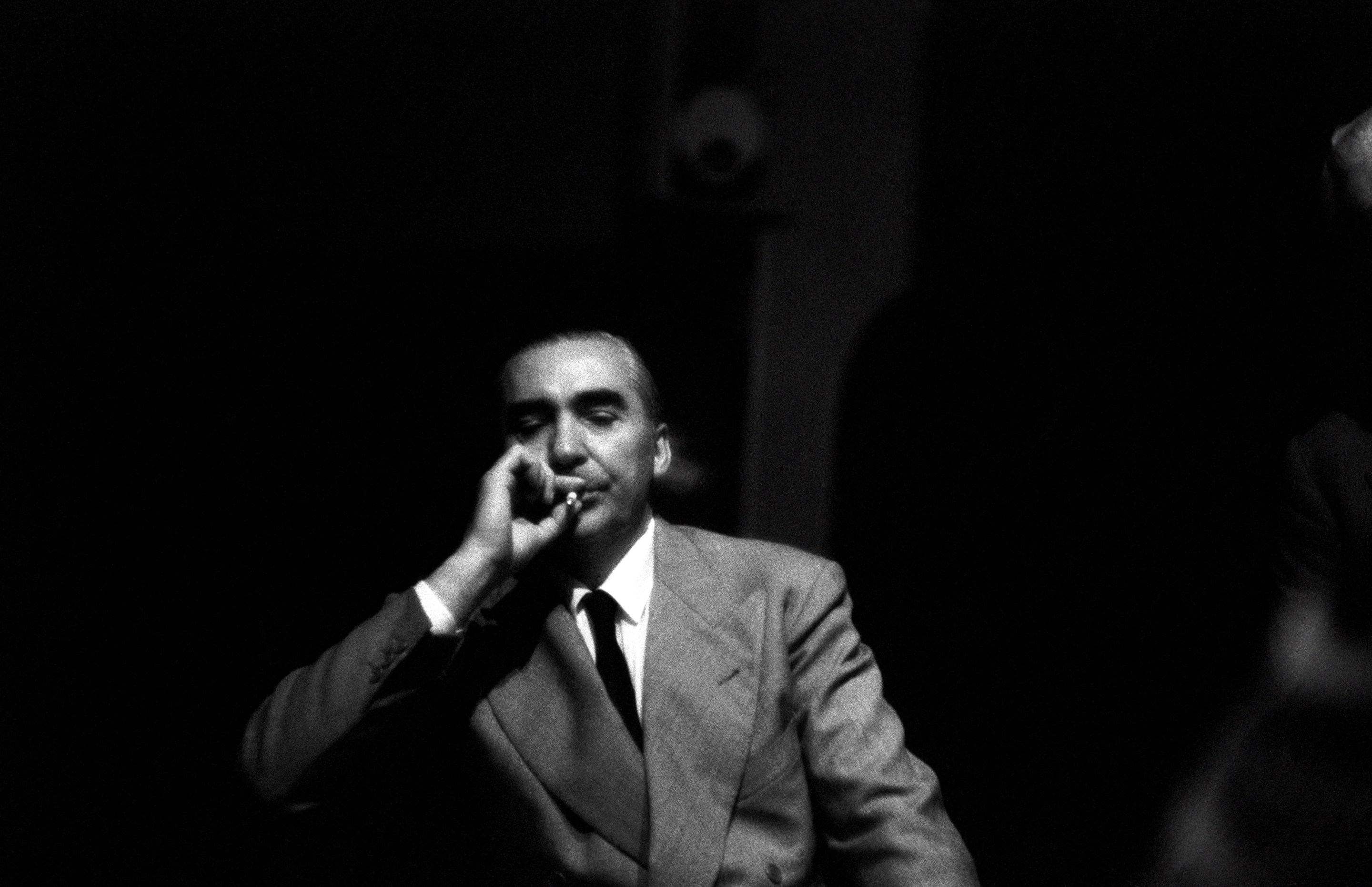Curzio Malaparte was the shape-shifting Zelig of the catastrophe of Italian fascism, a political and social operator of such profound equivocation that in his writings he seems almost to convince even himself of his own sincerity. In Maurizio Serra’s comprehensive biography, first published in Italian in 2011 and now available in English from New York Review Books, we follow Malaparte’s skittering movements across a century to which he seems uniquely suited and yet, near daily, increasingly familiar to our own.
Best known for his nightmarish 1944 novel of the Second World War, Kaputt, Malaparte—a novelist, journalist, playwright, diplomat, and filmmaker—wrote like a cross between Ernst Jünger and Thomas Pynchon, and lived like a daredevil prince. He was forever on the move, forever aggrieved, forever on the verge of world fame, even immortality, or, at the very least, slipping through whatever net was closing around him. He began his adult life as a fascist and became a communist in his later years (a conversion he seemed to think was more a shift of emphasis—his first book, 1931’s Coup d’Etat: The Technique of Revolution, argued that it was Mussolini’s own youthful Marxism that had made him such an effective revolutionary), before embracing Catholicism on his deathbed in 1957.
Malaparte was a consummate self-mythologizer, as well as razor-sharp critical mythographer of pre- and post-war Europe, and one struggles to reconcile his keen assessments of his contemporaries across the political and social spectrum with how sickeningly self-serving his every utterance obviously is. He was, above all, a man suited for a time marked by flux, when all the categories that now seem so concrete were still emerging, still in question, still subject to wild appropriations and radical revisions. Reading Malaparte is a vertiginous, often grotesque experience, but even through the nausea one cannot help admiring the artistry of someone who remained on his feet by never standing still.
It’s a strange blessing that the translation should be released in America now. It is an enormously valuable study of the fascist imagination, and of the extent to which it is a psychological movement as well as a political one. Reactionary movements of all stripes depend on figures like Malaparte (though they rarely possess his literary talent), who are willing to contort themselves into whatever shape the moment—or, more likely, the leader—requires of them, even to the point of utter distortion and degradation. Figures for whom “hypocrisy” is not simply too weak a charge, but a mistaken description, since that would require some semblance of a personal foundation to betray. On the other hand, reading in 2025 about Malaparte’s self-serving rise and humiliating fall among the worst of the 20th century’s political villains, we’re as likely to shrug as to gasp. Yeah, yeah, the violence, the shame, the betrayal; what else is new?
Born Kurt Erich Suckert in 1898 to a German father, a textile executive, and a Lombard mother, he was raised in haute-bourgeois comfort in Prato, Tuscany, before studying at La Sapienza University in Rome and taking up a career as a journalist. He fought bravely in the First World War as a mountain infantryman and joined Mussolini’s National Fascist Party in 1920, an allegiance that was as strategic as it was ideological. As Serra points out, “loyalty was for him a very relative concept.”
Hardly a street-fighter—he largely sidestepped the brawls between leftists and the Fascist syndicalists in the early interwar years, and he sat out the March on Rome entirely, something he would cheerfully lie about in Coup d’Etat—Malaparte nevertheless lent his pen as young party official and an increasingly well-known journalist in Florence to the most hardline and violent Fascist tendencies, always under the pseudo-revolutionary banner of “necessary extremism.”
His investment in popular forms—newspapers and pamphlets at first, later novels, plays, and films—reflects not only his voracious, multifaceted talent, but also his shrewd ability to seize upon sources of influence that were already operative and milk them for all they were worth. This naked opportunism is a hallmark of fascist ascendency—Gramsci once pointed out that the Fascist party operated primarily by infiltration and subsequent destruction of opposing bourgeois organizations, arguing, “Fascism is not based on any class that was not already in power”—but it was Malaparte’s ironic weakness to have been a little too adept at such maneuvering, a little too cunning for the comfort of his fellow thieves.
He seems to have had an uncomfortably singular way of going about interactions with fellow party members, allies in war, and other potentially fatal friends, which he frequently casts in his books as ironic truth-telling, but it could just as easily have been bad strategy for getting ahead, and while he did indeed manage to escape the worst his rivals had in mind for him, this may have been due in part to the fact that it’s often very difficult to tell if he is kidding. For instance, it would be easy to assume that his pen name, which he eventually took on as his legal name, was just such a half-joke, playing on the Italian meaning of the Corsican emperor’s family name, a knowing subversion of all the militarized portentousness that marked fascism from its beginnings. But, in fact, it was no subversion at all. As Serra tells it, Malaparte came across the name in a pamphlet that had become popular among the early fascists, who sought to claim the legendary emperor as an Italian. Sick of his enemies seizing upon anti-German sentiment to attack his original surname and eager to please the new dictator, who was fascinated by Napoleon, Kurt Suckert became Curzio Malaparte. As he wrote in a 1938 letter: “I took the name of Malaparte at the suggestion of Il Duce, who in 1926 told me: ‘A Fascist writer has to sign with an Italian name. Find yourself a pseudonym.’”
His masterpiece was 1944’s Kaputt, a fictionalized account of the Eastern Front that has a strong claim to the mantle of best novel to have emerged from the Second World War. It is a harrowing descent into the hell that spread over Romania, Poland, Ukraine, and elsewhere, in which Malaparte not only preemptively explodes the myth of a clean Wehrmacht (the postwar rehabilitation of the units who fought Hitler’s war arguing that because they were not counted among the inner sanctum of the SS they had not committed atrocities—they had) but tosses out with it the reassuring assumption that the prewar order itself was in some way a victim of the midcentury disaster. As every page of Kaputt makes agonizingly clear, the regimes of torture, assassination, theft, and manipulation that tore Europe apart were not the destruction of an earlier, uneasy yet civil compromise between liberal and aristocratic elites, but was rather that society’s apotheosis.
Each chapter of Kaputt is presented within a kind of frame narrative, in which Malaparte (author, narrator, and character all at once, and each only partially) discusses the terror he has witnessed while walking or dining with a well-heeled companion: the urbane, naïve Prince Eugene of Sweden, the menacing philistine Hans Frank, German Governor-General of Poland, the half-dashing Count Augustine de Foxa, Spanish Minister in Helsinki, and so on. In the gardens of Stockholm or at a high-class dinner party, the skeptical, sardonic, yet for all that the more humane Malaparte by turns shocks and evades his conversation partners, aware all the time that even as he is smarter, more experienced, and in every other way superior to them, he is living in dangerous times, and he is at their mercy. This semi-avowed self-aggrandizement (which, to be clear, seems not to be for effect, but really how Malaparte sees himself) would be utterly repulsive were it not for how irresistibly Malaparte tells his multilayered story. For while the wine is served (and overserved), or the snow falls gently in a quiet city, we are drawn ever deeper into a mind full of rotting animal carcasses, machine gun fire flying over the bed in which one sleeps, the corpses of 13,000 Jews lining the streets of the Romanian city of Jassy. (Malaparte was indeed present for this, one of the worst pogroms carried out during the war.) And each chapter, as if twisting the historical knife, draws us through the contrast between the stories themselves and where they are being told, the juxtaposition becoming more and more a parallel, until we see, with heartbreaking clarity, civilization and barbarism as one another’s mirror images. For all his anguish (the novel ends with our hero weeping in the streets of a liberated Naples), Malaparte was well suited to this inverted world, and had long practice with maneuvering through ruins.
And yet, he could not get by on maneuvering alone: As in any criminal gang, fascists tend to require dirty hands. Years earlier, according to Serra, Malaparte likely acted as an accessory after the fact to the infamous murder of socialist leader Giacomo Matteotti, who in 1924 had publicly denounced Fascism, accusing Mussolini to his face on the floor of the parliament of having committed fraud in the elections that brought the NFP into government. Matteotti, most likely on Mussolini’s orders, was beaten and stabbed to death by a small cadre of thugs, his body left to rot on the street in Rome.
It’s a characteristic irony of Malaparte’s life and work that he would later become such an exacting critic of fascism’s tendency toward just this kind of petty, murderous sleaze, to which he was, in his telling, always an increasingly disillusioned observer, if not already a world-weary witness. But the truth of the matter is that Malaparte always exhibited an attraction not only to violence, but to sordid violence, to dank alleyways and desolate forest clearings, apparently under the impression that to be on the tip of the spear of history, one must go where few others are willing to travel. Such a fascination is not, strictly speaking, out of step with the fascist imagination, but whereas his comrades’ propaganda promised cleanliness and hygiene in response to the imagined contamination of foreign influence, Malaparte saw no such purity in the offing. Instead, fascism provided an opportunity to dive headfirst into the filth, spattering whoever was standing nearby.
And yet even this he could find a way to spruce up, when it suited him. In his Diary of a Foreigner in Paris, a literary score-settling with the French intellectuals who scorned Malaparte after the war, he tells of watching a military parade on the Champs-Elysées: “Condemn me if you will,” he invites us in mock-heroic tones, “but I am a man, and I love war. I’m not such a hypocrite as to say ‘I don’t love war.’ I love it, like every well-born, healthy, courageous, strong man loves war, like every man who is not content with men, or with their misdeeds.”
It’s no credit to their acumen, then, that over the course of the Thirties even the fascists began to smell a rat. Early rapport with Mussolini and tutelage under other important party officials eventually buckled under the weight of Malaparte’s duplicity; Il Duce didn’t exactly take kindly to being reminded of his socialist youth, while other dispatches praising the Soviet Union’s early successes threatened to tilt party consensus around Malaparte from bemusement to suspicion. Beginning in 1933, he would spend a number of years in and out of various forms of incarceration and internal exile, mostly on the island of Lapari, with many shorter stays in Rome’s Regina Coeli prison. (During a later imprisonment, which lasted from 1938-41, he would design and begin construction on a villa on Punta Massullo, on the eastern coast of Capri, the astounding Casa Malaparte. Begun in collaboration with renowned modernist Adalberto Libera, the house was completed by Malaparte himself, assisted by a local stonemason. Now considered a masterpiece of 20th-century Italian architecture, it is perhaps best known as the beautifully alien setting for the final act of Jean-Luc Godard’s Le Mépris.)
A fall from grace seems inevitable for a character like Malaparte, but what triggered a series of such dramatic and, one imagines, unpleasant incarcerations? Malaparte would say that he had voiced his opposition to Mussolini’s persecution of non-Catholics and was duly punished. He would say that his Coup d’Etat so enraged the party that they sought his downfall (adding, presumably for good measure, that Hitler himself had demanded his arrest for a critical chapter on the Fuhrer, charmingly titled “Hitler: A Woman”). He would say that he demanded the cutting of all ties from Nazi Germany. Indeed, he would spend the 20-plus postwar years of his life insisting that it had been his staunch anti-fascism that had led to his political undoing. In reality, he had publicly slandered his former mentor, a famed pilot named Italo Balbo, when the national hero failed to praise an essay Malaparte had written for him. He had also made liberal use of public funds for his own purposes (hardly an uncommon practice in a kleptocractic regime like Mussolini’s, but fascists never seem to mind the charge of hypocrisy). Serra, summing up this decade of ill favor, writes: “But one thing is certain: anti-Fascism, which he invoked after 1943 as the main reason for his arrest, had nothing—or very nearly nothing—to do with it.”
Serra’s biography is particularly good for this kind of debunking. An astonishingly accomplished researcher, Serra crawls through mountains of evidence to reconstruct the events of Malaparte’s life, taking care not only to refute Malaparte’s own accounts, but to try to understand just how the lies emerged as they did, pointing sometimes to ambiguous evidence seized upon and misconstrued, but always emphasizing the root cause: the man was simply a pathological liar. “Some nerve!” Serra writes after one of Malaparte’s particularly egregious apologias. “Everything in this paragraph is false.”
What’s less clear, after 400-plus pages of such demystifying, is what is true, and, again, whether it matters. Despite, or indeed, because of this commitment to documentary evidence, Malaparte becomes a kind of specter in Serra’s telling, which undoubtedly to many who knew him, perhaps even to himself, he was. It made him a perfect fascist: a middle-class, amoral opportunist, free of most obligation or scruple, happy to capitalize on resentments for the sake of power and, more often, mere adventure. His utter lack of conscience also seemed to grant him access to a kind shadow realm from which he could witness the greatest depths of human depravity and remain, if not untouched, then at least intact. His art is one of elusiveness, of lack of candor, of shame and shameless defiance, of the power of a good alibi in the face of any horror.
Is the fact that it is undeniably great art, in any sense, redemptive? Taken as an isolated case, decades on and worlds apart, who cares? Surely we have exhausted our appetite for passing summary judgment on the “problematic” artists of the past. But that doesn’t exactly dispel the question. We are, after all, in a new era of reaction, the threat of tyranny looming over us with renewed terror, and we see every day the proliferation of Malaparte-types: unscrupulous, self-serving dissemblers, who will sacrifice any vestige of principle for a day spent in power’s cold sun. But like how today’s oligarchs don’t even have the decency to build beautiful mansions we might one day turn into public museums, our cynical operators are so satisfied with their meddling that they don’t even write novels. We live, increasingly, in a world of hollow men who, unlike Malaparte, don’t even cast a lingering shadow.






